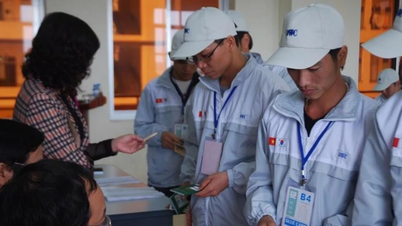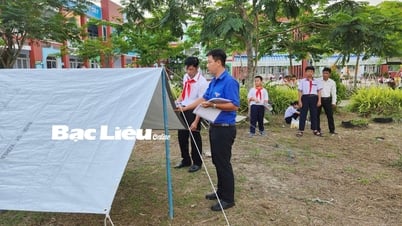
The National Assembly discussed the draft Law on Juvenile Justice on the morning of June 21, 2024.
Separating cases involving minors for separate trials is necessary.
On the morning of June 21, continuing the 7th Session, the National Assembly discussed in the hall the draft Law on Juvenile Justice.
Expressing agreement with many contents in the draft law, delegate Phan Thi Nguyet Thu ( Ha Tinh ) mentioned the regulation of separating cases involving minors committing crimes to be resolved separately as stipulated in the draft law.
Delegates said that separating cases involving minors committing crimes for independent resolution and prioritizing simplified procedures is necessary to ensure the rights of minors committing crimes, in accordance with the Party's and State's policies and the Convention on the Rights of the Child, of which Vietnam is a member.

Regarding the principle of separating cases to resolve them through friendly procedures, the delegate said that currently, cases involving minors are being tried in the adult courtroom, making it impossible to implement a superior and humane policy for minors.
If we investigate, prosecute and try adults together, there will be problems and limitations in assigning people to conduct proceedings to fight against masterminds and leaders who are professional thugs and dangerous subjects.
The delegate also said that separating the cases is to ensure the most objective and correct determination of the truth of the case because when going to court, facing the mastermind, the thugs, the dangerous ones... will make the students feel afraid, not daring to tell the truth; they may give crooked or false statements out of fear, so they need to be separated and tried separately.
On the other hand, separating cases for separate settlement not only ensures objectivity, science , efficiency, and the best interests of minors, but also ensures accurate assessment and statistics of the crime situation, case data, and causes of juvenile crime, thereby allowing state management agencies to have more effective solutions to prevent and limit crimes among adolescents.

Further debating with National Assembly deputies about separating criminal sentences for minors who commit crimes, deputy Nguyen Thi Thuy, National Assembly delegation of Bac Kan province, and Vice Chairwoman of the National Assembly's Judicial Committee, said that this is consistent with the new policies stipulated in this law.
According to the delegate, the draft law adds a provision to shorten the time limit for litigation. The current law stipulates that the time limit for litigation for adults is the same as that for children. However, the draft law has met the requirements of the international convention on time limits for litigation, which stipulates: "The time limit for litigation for children is half that for adults."
In addition, regarding the provisions on handling diversion, the current law does not allow the time for applying this measure to be deducted from the time for resolving the case. This causes pressure and anxiety for case-solving officers. To overcome this situation, the draft law allows the time for applying diversion measures to be deducted from the time for resolving the case.
"In this case, if there is no provision to separate the case with minors, the time limit for resolving the proceedings with adults will have expired, but the time limit for resolving the case with children will still exist, while the case has not yet ended," the delegate pointed out the inadequacy.
In response to this issue, the draft law adds a new principle that "all information about minors is kept confidential throughout the entire process of resolving the case". If the case is combined with both minors and adults, it will lead to the need to fully inform both subjects in the indictment and the investigation conclusion, the verdict about the development of their criminal behavior and their personal background. This leads to a violation of the above added principle.
In addition, if the case includes both minors and adults, children will have access to the full range of schemes, tricks, and criminal behavior of adult criminals.
This would not be in the best interests of minors or the need for education and personality training to reintegrate into the community. Therefore, the delegates agreed with the provision of separating criminal cases from juvenile offenders to meet the progressive and humane provisions of the draft law.
It is necessary to clearly define resources for monitoring the implementation of diversion measures.

Regarding the discussion on the measures to handle diversion, delegate Nguyen Thi Viet Nga (Hai Duong) said that Article 36 of the draft law currently stipulates 12 measures to handle diversion, of which 3 measures that the delegate said need to be carefully considered for feasibility, including the measures of "prohibiting contact with people at risk of causing minors to commit new crimes", "restricting travel hours" and "prohibiting going to places at risk of causing minors to commit new crimes".
Delegates said that these measures sound reasonable, but in reality, it will be difficult to effectively implement them, because there is no human resource to monitor who minors meet, where they go, and at what times they go every day and every hour, while these measures, according to the draft law, have an application period of at least 3 months to 1 year.
For these measures to be feasible and effective, the Russian delegate said that it is necessary to have very clear regulations, especially the preparation of human resources and equipment to serve the task of monitoring the implementation of measures to handle and redirect juvenile offenders.
Regarding this content, delegate Phan Thi My Dung (Long An) also said that it is necessary to evaluate and clarify the feasibility and resources to implement measures such as "prohibiting contact, limiting travel hours", "house arrest", "prohibiting going to places that are at risk of leading to juvenile crime".
Delegate Le Thi Thanh Lam (Hau Giang) proposed the need to develop additional regulations related to redirection handling, as well as strengthen training and professional development for judicial officials to improve their capacity to apply redirection handling.
In addition, building and developing community-based programs and services to help juveniles who have been processed quickly reintegrate into society and avoid reoffending.
Diversion treatment promotes the voluntary participation of minors
Speaking to explain and clarify some issues raised by National Assembly deputies at the discussion session, Chief Justice of the Supreme People's Court Nguyen Hoa Binh said that many National Assembly deputies were concerned about the handling of redirection in the draft law, and suggested expanding the age range for applying redirection measures to people aged 12-14.
However, the Chief Justice informed that according to the current Penal Code, people under 14 years old who commit crimes are not criminally responsible. Therefore, the age calculated according to current regulations does not define this as a crime.

Regarding the conditions of application, the draft law stipulates the condition of "must be voluntary". According to Chief Justice Nguyen Hoa Binh, the goal of diversion treatment is that children must be voluntary and see their shortcomings in order to sincerely correct them.
According to the Chief Justice, voluntary conditions are mandatory, but if the children are faced with two choices when suspected of committing a crime, either agree to change direction, or agree to investigation, prosecution, and trial.
“The law gives children a choice, but I believe both parents and children choose the diversionary treatment method. If they do not voluntarily correct themselves according to the opportunities provided by society and the law, it will trigger the normal investigation, prosecution, and trial process,” the Chief Justice said.
Similarly, regarding the regulation of fines, Chief Justice Nguyen Hoa Binh said that the law does not place too much emphasis on money.
"For children with inheritance or assets, agreeing to pay money is a sincere act of remedying the consequences. This is what we need, not a heavy burden of 50 or 100% of the remedy amount. Children voluntarily remedying and paying the violation fee has demonstrated responsibility for correcting mistakes," said the Chief Justice.
Regarding the regulation prohibiting going to places with a risk of contact with new criminals, many delegates requested clarification on how the ban will be implemented and what time frame it will be implemented?
The judge said that this ban would depend on the juvenile’s violations: “If they often steal from supermarkets, they will be banned from supermarkets. If they sexually abuse children, they will be banned from places where children gather. If they violate drug laws, they will be banned from places where drugs are prevalent… This depends on the juvenile’s behavior.”
Source




![[Photo] More than 17,000 candidates participate in the 2025 SPT Competency Assessment Test of Hanoi National University of Education](https://vphoto.vietnam.vn/thumb/1200x675/vietnam/resource/IMAGE/2025/5/17/e538d9a1636c407cbb211b314e6303fd)
![[Photo] Readers line up to visit the photo exhibition and receive a special publication commemorating the 135th birthday of President Ho Chi Minh at Nhan Dan Newspaper](https://vphoto.vietnam.vn/thumb/1200x675/vietnam/resource/IMAGE/2025/5/17/85b3197fc6bd43e6a9ee4db15101005b)

![[Photo] Prime Minister Pham Minh Chinh chairs meeting on science and technology development](https://vphoto.vietnam.vn/thumb/1200x675/vietnam/resource/IMAGE/2025/5/17/ae80dd74c384439789b12013c738a045)




























![[Photo] Nearly 3,000 students moved by stories about soldiers](https://vphoto.vietnam.vn/thumb/1200x675/vietnam/resource/IMAGE/2025/5/17/21da57c8241e42438b423eaa37215e0e)


































































Comment (0)